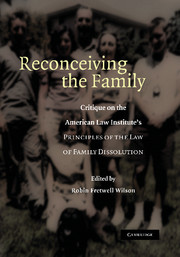 Reconceiving the Family
Reconceiving the Family Book contents
- Frontmatter
- Contents
- Acknowledgments
- Foreword, by Mary Ann Glendon
- List of Contributors
- Introduction
- PART ONE FAULT
- PART TWO CUSTODY
- PART THREE CHILD SUPPORT
- PART FOUR PROPERTY DIVISION
- 8 The ALI Property Division Principles: A Model of Radical Paternalism?
- 9 Unprincipled Family Dissolution: The ALI's Recommendations for Division of Property
- 10 You and Me against the World: Marriage and Divorce from Creditors' Perspective
- PART FIVE SPOUSAL SUPPORT
- PART SIX DOMESTIC PARTNERSHIP
- PART SEVEN AGREEMENTS
- PART EIGHT JUDICIAL AND LEGISLATIVE PERSPECTIVES
- PART NINE INTERNATIONAL REFLECTIONS
- Afterword: Elite Principles: The ALI Proposals and the Politics of Law Reform, by Carl E. Schneider
- Index
10 - You and Me against the World: Marriage and Divorce from Creditors' Perspective
Published online by Cambridge University Press: 25 January 2010
- Frontmatter
- Contents
- Acknowledgments
- Foreword, by Mary Ann Glendon
- List of Contributors
- Introduction
- PART ONE FAULT
- PART TWO CUSTODY
- PART THREE CHILD SUPPORT
- PART FOUR PROPERTY DIVISION
- 8 The ALI Property Division Principles: A Model of Radical Paternalism?
- 9 Unprincipled Family Dissolution: The ALI's Recommendations for Division of Property
- 10 You and Me against the World: Marriage and Divorce from Creditors' Perspective
- PART FIVE SPOUSAL SUPPORT
- PART SIX DOMESTIC PARTNERSHIP
- PART SEVEN AGREEMENTS
- PART EIGHT JUDICIAL AND LEGISLATIVE PERSPECTIVES
- PART NINE INTERNATIONAL REFLECTIONS
- Afterword: Elite Principles: The ALI Proposals and the Politics of Law Reform, by Carl E. Schneider
- Index
Summary
Legal regulation of families has two aspects. The first defines the rights and obligations of family participants inter se. It addresses who may marry or otherwise form a legally recognized family and resolves issues that arise when that family breaks up. The second aspect addresses the effect of legal family status on the participants' relationships with outsiders such as credit card issuers, tort claimants, taxing authorities, and medical care providers. The Principles focus exclusively on the inter se relationships of family members with each other, particularly with respect to responsibility for and financial support of dependent family members. The Principles do not address individual family members' relationships with their creditors, either during marriage or following divorce.
This omission is understandable. As an academic subject, family law addresses family relationships. The interaction of family members with outsiders is addressed in other areas of law, for example contract, tort, and tax law. Although it makes sense that the Principles do not consider the external effect of family relationships, it is a mistake to infer that changes in family law will have no ramifications outside the family on credit relationships. The predominant focus of this volume is on how the Principles would affect family members' relationships with each other. This chapter takes a different approach and considers how legal regulation of marriage appears from the outside looking in.
- Type
- Chapter
- Information
- Reconceiving the FamilyCritique on the American Law Institute's Principles of the Law of Family Dissolution, pp. 195 - 208Publisher: Cambridge University PressPrint publication year: 2006
- 2
- Cited by


